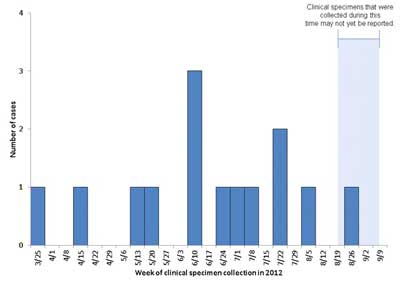A recall for cheese linked to Listeria illnesses posted Monday by the U.S. Food and Drug Administration (FDA) provided little information about the outbreak that has sickened 14 people and killed two. One day later, a report from the Centers for Disease Control and Prevention (CDC) filled in some gaps but it also raised questions, according to a national food safety advocate.
“Forever Cheese is recalling cheese sold to distributors between June 20 and August 9, 2012, yet the CDC Epi Curve clearly shows that many outbreak illnesses occurred long before the recall period. This implies that more product was implicated,” said Fred Pritzker, food safety attorney and advocate. Pritzker is referring to the bar graph included in all CDC outbreak reports that shows when samples from sick people were collected for testing.

Unlike Salmonella which can cause patients to become ill within six hours of eating contaminated food, Listeria can take up to 10 weeks, although the average incubation period is about three weeks. The epi curve for this outbreak shows the first sample was taken March 25 and the most recent sample was taken August 26. So, half of the patients were sick enough to visit doctors and be tested for Listeria before the effective date for the recall.
Cheese is perishable, so was all the cheese that may have been tainted long gone before June 20? Not necessarily. According to the company’s own website, Frescolina brand ricotta salata has a shelf life of four months. That should put the recall start date at least back to May and maybe earlier. That still doesn’t get the recall dates and the epi curve to make sense but, another explanation does: cross-contamination.
“The CDC report makes clear that outbreak patients consumed a number of soft cheeses that were likely cross-contaminated by the recalled Frescolina brand ricotta salata cheese,” said Pritzker. That would account for the illnesses on the first part of the epi curve. Recalls for other cheeses have not yet been associated with this outbreak. Pritzker says they should be, as soon as possible. “While I understand the hardship that may befall a producer of a cheese implicated in a recall that was cross-contaminated through no fault of its own, it is still vitally important to identify the product so consumers can be aware of and avoid the risk,” he said.




